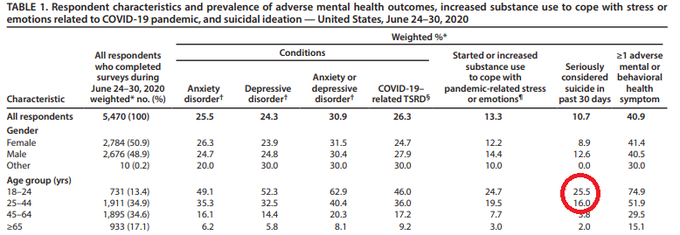
Jon Miltimore – August 15, 2020
In economics, we talk a lot about unintended consequences.
It’s easy to forget that societies are complex ecosystems. Legislators often pass sweeping changes hoping to achieve one result, not realizing it will create countless other consequences not intended.
Some of the unintended consequences will be positive, but many of them will not be. A case in point can be found in new government statistics that show a surge in suicidal thoughts among young adults during the COVID-19 pandemic.
One in four young adults between the ages of 18 and 24 say they’ve considered suicide in the past month because of the pandemic, according to new CDC data that paints a bleak picture of the nation’s mental health during the crisis.
The data also flags a surge of anxiety and substance abuse, with more than 40 percent of those surveyed saying they experienced a mental or behavioral health condition connected to the Covid-19 emergency. The CDC study analyzed 5,412 survey respondents between June 24 and 30.
The toll is falling heaviest on young adults, caregivers, essential workers and minorities. While 10.7 percent of respondents overall reported considering suicide in the previous 30 days, 25.5 percent of those between 18 to 24 reported doing so. Almost 31 percent of self-reported unpaid caregivers and 22 percent of essential workers also said they harbored such thoughts. Hispanic and Black respondents similarly were well above the average.

The article says the mental health crisis stems “from the pandemic,” but it’s more accurate to say it stems far more from our collective reaction to the pandemic, not the actual virus.
Locking down economies and ordering healthy people to remain isolated might have succeeded, to some degree, in slowing the spread of the virus. But it was also a surefire way to make people miserable.
Lockdowns result in job loss, anxiety, and despair. Scientists have long known the effects of social isolation aren’t just harmful, but deadly.
The New York Times explained the deadly consequences of social isolation in 2016:
A wave of new research suggests social separation is bad for us. Individuals with less social connection have disrupted sleep patterns, altered immune systems, more inflammation and higher levels of stress hormones. One recent study found that isolation increases the risk of heart disease by 29 percent and stroke by 32 percent.
Another analysis that pooled data from 70 studies and 3.4 million people found that socially isolated individuals had a 30 percent higher risk of dying in the next seven years, and that this effect was largest in middle age.
Loneliness can accelerate cognitive decline in older adults, and isolated individuals are twice as likely to die prematurely as those with more robust social interactions. These effects start early: Socially isolated children have significantly poorer health 20 years later, even after controlling for other factors. All told, loneliness is as important a risk factor for early death as obesity and smoking.
Many of the consequences listed here will take years to analyze and document, but we’ve seen glimpses of more immediate unintended consequences already: rampant suicide, surging drug overdoses, increases in domestic violence, economic destruction, and many others.
None of these consequences were intended when lawmakers passed sweeping lockdowns, but that does not make them less real. Nor do pure intentions absolve lawmakers of responsibility.
The famed economist Milton Friedman once observed that perhaps the greatest threat to liberty comes “from men of good intentions and good will who wish to reform us.”
In this case, the well-intentioned seek not to reform us but to protect us. But as Friedman noted, “concentrated power is not rendered harmless by the good intentions of those who create it.” Indeed, many of the greatest atrocities in history have been perpetrated by well-meaning people.
Above all else, we must judge lockdowns by their actual results, not what they were designed to do.
If we fail in that, these troubling CDC statistics are likely to become the norm, not the exception.
Originally published at Fee.org. Jonathan Miltimore is the Managing Editor of FEE.org. His writing/reporting has been the subject of articles in TIME magazine, The Wall Street Journal, CNN, Forbes, Fox News, and the Star Tribune. Bylines: The Washington Times, MSN.com, The Washington Examiner, The Daily Caller, The Federalist, the Epoch Times.
Image Credit: Pikist